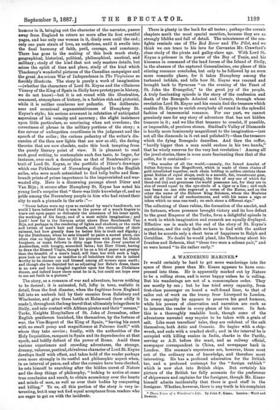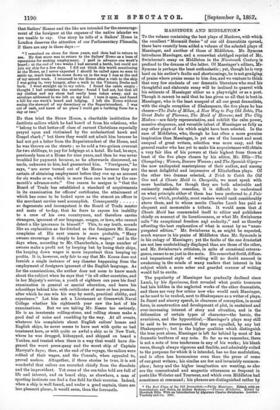A WANDERING MARINER.*
Tr would certainly be hard to get more wanderings into the space of three years than Mr. Keane appears to have com- pressed into them. He is apparently marked out by Nature to be a rolling stone, and is never happy unless he is rolling. But his wanderings are not of a commonplace order. They are mostly by sea ; but he has tried every capacity, from first-class passenger on board a well-found liner, to that of sailor out of work on the tramp froro Liverpool to London. In every capacity he appears to preserve his good humour, while his powers of observation and narration are such as to interest the reader in every phase of his career. In fact, this is a thoroughly readable book, though some of the adventures narrated. may require to be taken with a grain of salt. Like most travellers' tales, they are redolent of the salt themselves, both Attic and Oceanic. He begins with a ehip- wreck, and ends with a cracked skull ; and in the interval he is occupied with killing snakes in India, sharks in the Pacific, serving as A.B. before the mast, and as railway official, newspaper correspondent in China, and newspaper hack in London. His seaman's experiences are, however, those most out of the ordinary run of knowledge, and therefore most interesting. He has a profound admiration for the British tar, and a profound contempt for the "foreign rubbish" which is now shot into British ships. But certainly his picture of the British tar fully accounts for the preference of shipowners and captains for the foreigner, though Mr. Keane himself admits incidentally that there is good stuff in the foreigner. Whether, however, there is any truth in his complaint
• Three Years of a Wanderer's Life. By John F. Keane, London Ward and Downey.
that Sailors' Homes and the like are intended for the encourage- ment of the foreigner at the expense of the native islander we are unable to say. One story he tells of a Sailors' Home in London deserves the attention of our Parliamentary Plimsolls, if there are any in these days
" I remained on shore for three years, and then had to return to BM My first move was to return to the Sailors' Home as a base of operations for seeking employment. I paid in advance one week's board ; at the end of two weeks I had secured a berth, but could not join my ship for a few days. I did not think this worth mentioning at the Home, as I never expected I should be called upon BO soon to settle up, much bee to be come down on in the way I was at the end of my second week. I returned to the Home after a visit to the ship I was going in very hungry, after a walk to the Victoria Docks and back. I wenestraight up to my cabin. I found the cabin empty : thought I had mistaken the number: found I had not but that all my clothes and my chest had really been taken away, and an envelope addressed to me left on my bed. I tore it open, and found a bill for one week's board and lodging. I left the Home without seeing the steward of my dormitory or the Superintendent. I was out of cash, and knew of no place I could get a farthing from for a day or two."
He then tried the Straw House, a charitable institution for destitute sailors which he had heard of from his relations, who "belong to that better-off class of earnest Christians especially preyed upon and victimised by the ecclesiastical hawk and Gospel shark ;" but there they would not admit him because he bad not got a letter from the Superintendent of the HOMS, and he was thrown on the streets ; so he sold a two-guinea overcoat for two shillings, to pay for lodgings at a hotel. He had, he says, previously been at a Home for nine years, and then he was never troubled for payment because, as he afterwards discovered, an uncle, unknown to him, had guaranteed him. "Foreigners," he says, "are never turned out of the Home because they are certain of obtaining employment before they run up an account for six weeks or so, which is more than can be met by the one. month's advance-note." One reason he assigns is "that the Board of Trade has established a standard of acquirements in its examination for officers' certificates, the attainment of which has come to be looked upon as the utmost an officer in the merchant service need accomplish. Consequently so degenerate and incompetent is the Board of Trade master and mate of to-day, that he fears to expose his inability to a crew of his own countrymen, and therefore carries strangers, ignorant of our language, usages, or laws, who cannot detect a like ignorance in himself." This, to say truth, sounds like an explanation as far-fetched as the foreigners Mr. Keane complains of. His next reason is more probable, "Many owners encourage it simply to keep down wages ;" and in the days when, according to Mr. Chamberlain, a large number of owners make a profit not by keeping but by losing their ships, the keeping down wages is more important than keeping up profits. It is, however, only fair to say that Mr. Keane does not furnish a single instance of any disaster happening from the employment of foreigners ignorant of the English language. As for the examinations, the author does not seem to know much about the subject when he says that "in all other countries, and in her Majesty's service, a youth of eighteen can pass his final examination in general or special education, and leave his schooldays behind him with certificates of more or lees promise, after which he can win his way by merit, practical ability, and experience." Let him ask a Lieutenant at Greenwich Naval College whether his eighteenth year saw the last of his examinations. But we are taking Mr. Keane too seriously. He is an inveterate rolling-stone, and rolling stones make a good deal of noise and rambling by the way. At all events, whatever his complaints about English sailors' homes and English ships, he never seems to have met with quite so bad treatment here, or with quite so awful a ship as in New York, where be was drugged, kidnapped, and shipped on board a Yankee, and treated when there in a way that would have dis- graced the worst press-gang and the worst ship of Captain Marryat's days; then, at the end of the voyage, the sailors were robbed of their wages, and the Consuls, when appealed to, proved useless. Altogether, if these stories be true, it is not wonderful that sailors are recruited chiefly from the dissolute
and the improvident. Yet some of the sea-tales told are full of life and interest, and on board ship, as elsewhere, a man of sporting instincts can find a fine field for their exercise. Indeed, when a ship is well found, and under a good captain, there are less pleasant places, it would seem, than the forecastle.



































 Previous page
Previous page